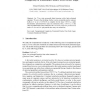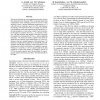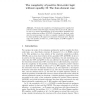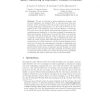7 search results - page 1 / 2 » Complexity of Existential Positive First-Order Logic |
CIE
2009
Springer
13 years 11 months ago
2009
Springer
Let Γ be a (not necessarily finite) structure with a finite relational signature. We prove that deciding whether a given existential positive sentence holds in Γ is in LOGSPACE...
AAAI
2007
13 years 6 months ago
2007
The use of ontologies in various application domains, such as Data Integration, the Semantic Web, or ontology-based data management, where ontologies provide the access to large a...
CSL
2010
Springer
13 years 5 months ago
2010
Springer
We study the complexity of evaluating positive equality-free sentences of first-order (FO) logic over fixed, finite structures B. This may be seen as a natural generalisation of th...
STACS
2001
Springer
13 years 8 months ago
2001
Springer
In 1974 R. Fagin proved that properties of structures which are in NP are exactly the same as those expressible by existential second order sentences, that is sentences of the form...
SEBD
2007
13 years 5 months ago
2007
The use of ontologies in various application domains, such as Data Integration, the Semantic Web, or ontology-based data management, where ontologies provide the access to large am...




